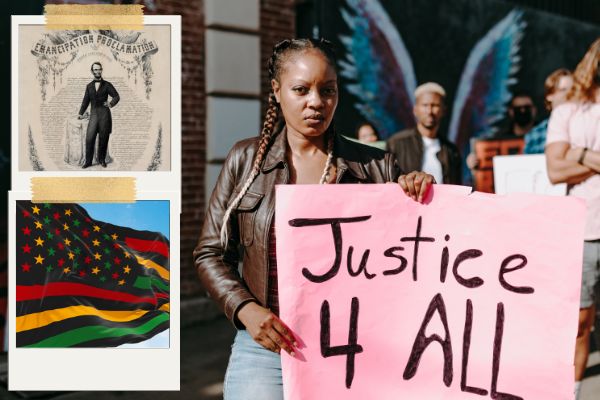

In 2021, the USA surprised the rest of the world with the sudden introduction of a new holiday: Juneteenth. We explain what is behind the latest US holiday on June 19th.
Juneteenth is short for June Nineteenth. The most traditional African American holiday and commemoration remembers the date in 1865 when Union troops arrived in the city of Galveston near Houston to enforce the end of slavery in Texas. The official name of the latest US holiday is Juneteenth National Independence Day. In everyday life, however, other names are also common, such as Freedom Day, Jubilee Day, Emancipation Day, Black Independence Day, or Juneteenth Independence Day.

The history of Juneteenth begins with the Emancipation Proclamation, officially Proclamation 95, issued by US President Abraham Lincoln on January 1st, 1863, in the midst of the American Civil War. Highly controversial at the time, the legislation stipulated that all enslaved people in the states of the Confederacy were to be free forever.
However, the Emancipation Proclamation could not be implemented until after the end of the Civil War. Two months after General Robert E. Lee signed the capitulation of the Confederate South at Appomattox Court House in Virginia, Union troops led by General Granger reached the city of Galveston on June 19th, 1865, and declared freedom for some 250,000 Texan slaves.
The state of Texas, located in the far South of the USA, had previously been largely spared the impact of the war. Slavery also continued, almost unaffected by the political changes in the country until after the end of the war. According to a widespread legend, Texans "just didn't notice." In truth, however, Texas saw itself as the last bastion of slavery in the United States and had simply been unwilling to abolish it until Granger's troops entered the state.
Even after June 19th, 1985, the new legislation took a few more months to be finally enforced. For example, some people still had to help with the harvest. With the enactment of the 13th Amendment on December 18th, 1865, slavery officially ended in the United States.

Immediately after the arrival of Union troops in Texas, some of the newly freed people began to celebrate the event with prayers, song, and dance. In Texas, this gave rise to the annual "Jubilee Day" celebrations.
Over the years, a Juneteenth tradition developed with music, parades, church services, speeches, educational events, picnics, and barbecues. New clothes were always worn to the celebrations – a symbol of newfound freedom. Gradually, Juneteenth celebrations spread from Texas to other parts of the United States.
After more than 100 years of Juneteenth being celebrated informally by African American communities, Texas became the first US state to declare it an official holiday in 1979. By 2020, Juneteenth was recognized as a holiday or commemorative day in every state except South Dakota. However, it was a paid holiday for state employees only in Texas at that time.
As a result of the summer 2020 protests, Juneteenth became a paid holiday in nine other states, including New York, Virginia, and Washington, as well as in some cities and counties. Finally, on June 17th, 2021, President Joe Biden signed the legislation passed shortly before in Congress that elevated Juneteenth to a national holiday.
Do you want to learn more about typical American holidays? Then be sure to check out our articles on Halloween, Thanksgiving, and Independence Day.
Win one of 55,000 Green Cards in the official Green Card Lottery of the US authorities!